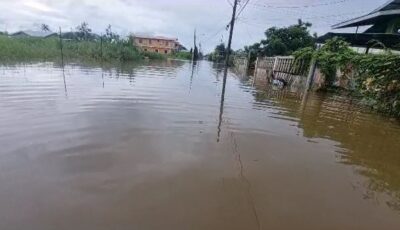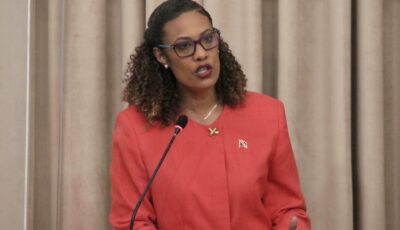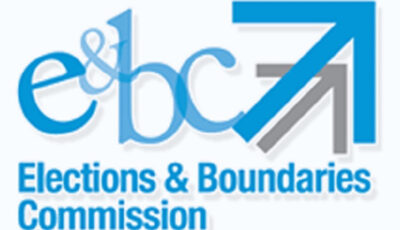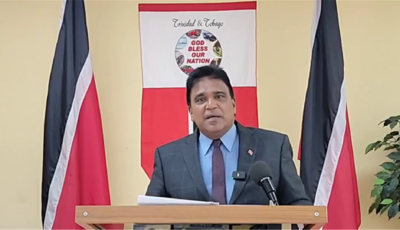MEDIA RELEASE: NEATF Members
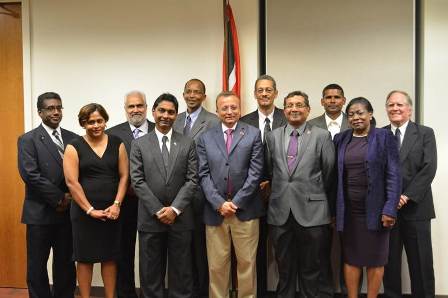
Appointed members of the National Environmental Assessment Task Force: Front row middle- Minister of the Environment and Water Resources, Senator the Honourable Ganga Singh. From left to right (Front row) Dr Rahanna Juman– Institute of Marine Affairs, Professor Indar Ramnarine, Chairman – Institute of Marine Affairs, Dr. Allan Bachan, Chairman- Environmental Management Authority, Ms. Christine Chan A Shingh, Director-Fisheries Division, Ministry of Food Production. Back row from Left to right Mr. Jalaludin Khan – National Trust of Trinidad and Tobago, Dr. Akenath Misir, Principal Medical Officer – Environmental Health, Ministry of Health, Mr. Neil Alleyne, Head of Petroleum Engineering – University of Trinidad and Tobago, Professor John Agard, Pollution and Environmental Control – University of the West Indies, Dr. Darryl Banjoo- Institute of Marine Affairs and Mr. Nigel Darwent– Deputy Chairman, Trinidad and Tobago Petroleum Company Limited (NP.
The members of the National Environmental Assessment Task Force (NEATF) were officially presented with their Letters of Appointment by Senator the Honourable, Ganga Singh, Minister of the Environment and Water Resources on Friday 7th February, 2014 at the Ministry of the Environment and Water Resources Conference Room, Port of Spain.
The Task Force has been established to oversee all activities that are necessary to address the environmental impacts of the oil spills at the Petroleum Company of Trinidad and Tobago (PETROTRIN) affecting the coastline of the South West Peninsula of Trinidad and Tobago. The force will also provide guidance to the Environmental Management Authority as a lead agency in the clean-up efforts.
NEATF Members present today included:
§ Dr. Allan Bachan – Chairman, Environmental Management Authority
§ Professor Indar Ramnarine – Chairman, Institute of Marine Affairs
§ Ms Christine Chan A Shingh – Director, Fisheries Divison, Ministry of Food Production
§ Dr Rahanna Juman – Institute of Marine Affairs (Wetlands Ecology)
§ Dr Darryl Banjoo – Institute of Marine Affairs (Marine Chemistry)
§ Professor John Agard – University of the West Indies (Pollution and Environmental Control)
§ Mr. Neal Alleyne – Head, Petroleum Engineering, University of Trinidad and Tobago
§ Mr. Jalaludin Khan – Chairman, National Trust of Trinidad and Tobago
§ Dr. Akenath Misir – Principal Medical Officer, Environmental Health, Ministry of Health
§ Mr. Nigel Darwent – Deputy Chairman, Trinidad and Tobago National Petroleum Marketing Company (NP)
Minister Singh explained that three other members of the NEATF are to be selected in the coming weeks. These include:
- A local representative with expertise in offshore transport and fate of oil/oil spill dispersion modelling
- An international representative with expertise in restoration and rehabilitation activities related to oil spills (United States Fish and Wildlife Agency)
- An international representative with expertise in oil field safety and management to assist with the development of guidelines for risk mitigation, which will enhance the environmental regulatory permitting processes (United States Environmental Protection Agency)
The Terms of Reference of the Task Force are as follows:
- To confirm all sources of the oil spills into the Gulf of Paria;
- To co-ordinate the monitoring of work carried out by Government Departments and other public bodies to access the environmental impact of the PETROTRIN Oil Spill and the subsequent clean-up activities;
- To establish Shoreline Clean-up and Assessment Teams (SCAT) to undertake reconnaissance surveys of damaged resources and select study sites for damage assessment;
- To identify sampling and the monitoring priorities for evaluating impacts of the oil spills;
- To identify final prioritization – decide which detailed studies to undertake and Document assessment process – reasons for decisions on priorities and strategies;
- To document the fate and behavior of the oil and the effectiveness of the clean-up;
- To initiate and co-ordinate studies to ensure that a comprehensive set of monitoring data on environmental distributions and impacts is obtained;
- To determine through studies and assessment programmes the overall impact of the incident on environmental resources of the area affected, these resources to include but not limited to fisheries, invertebrate resources, benthic ecology and wetlands, as well as to assess the subsequent recovery of these resources; the assessment to also include discussion of fate and effects of unrecovered oil left to biodegrade and weather in natural environments, information on the distribution of pollutants relevant to human health to be passed to public health authorities for assessment;
- To assess the capabilities and constraints for minimizing environmental resource impacts and enhancing recovery and identify appropriate mitigation measures;
- To develop a long term Remediation and Rehabilitation Action Plan to address the environmental impacts and make recommendations on future monitoring and studies of the effects of the oil spills on the environment;
- To make recommendations on all technical matters relating to the planning and development and implementation of the Remediation and Rehabilitation Action Plan;
- To oversee the monitoring and evaluation of the Remediation and Rehabilitation Action Plan to determine its effectiveness;
- To develop a National Environmental Impact Mitigation and Assessment Response Framework;
- To review and approve all reports and outputs resulting from the exercise;
- To provide co-ordination between different Government agencies, industry sectors and other groups with interest in the issue (environment, energy, transport, fisheries, and etcetera);
- To provide a forum for inter-ministerial and cross-sectoral communication and consultation on the issue;
- To identify and co-opt additional resources, including appropriate sectoral representation as required to assist with the functions of the Task Force.




